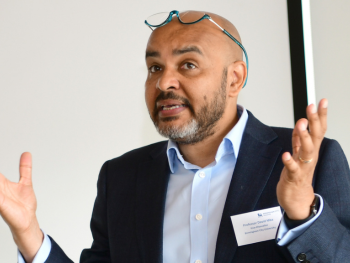University News Last updated 19 July 2024

Birmingham City University’s Vice-Chancellor, Professor David Mba, believes a new apprenticeships action plan will “supercharge creative education and the creative industries” following years of Government neglect.
In collaboration with University of Arts London (UAL), Professor Mba (pictured) has published a report that highlights the huge contribution that the creative industries make to the UK economy.
Additionally, the two universities will establish a Creative Apprenticeship Leadership Forum to develop a vision for technical and professional apprenticeships.
The goal is to deliver an action plan by the start of 2025.
Their work underlines the potential for apprenticeships to increase the contribution made by creative industries, by tackling the skills shortage giving some employers cause for concern.
Professor Mba explained: “Now is the time to reverse the wrongs of the previous Government and help society understand and value the creatives and the creative industries.
“Our challenge is to raise awareness of the impact of transformative creative education. It is to demonstrate the worth of the creative sector to public, to investors, and to government.”
Statistics published by the Department for Culture, Media and Sport (DCMS) estimated that the creative industries generated £124.6bn and employed 2.4 million people in 2022.
However, there is a rising number of job vacancies in the creative sector that are being left unfilled because applicants do not have the right skills, qualifications or experience.
That is where apprenticeships can help, says Professor Mba.
At present, creative apprenticeships lag firmly behind apprenticeships in other sectors.
Of 349,200 apprenticeships starts in the 2021/22 academic year, only 2,000 were in the creative sector. Of those 2,000, only a tiny handful were at degree level.
Professor Mba said the change of government is an opportunity to address the low take-up and tackle the negative rhetoric that surrounds creative education and creative industries.
Under former Prime Minister Rishi Sunak, the Conservatives wanted to axe thousands of what they termed “rip-off” degrees, further exacerbating the skills shortage in the creative sector.
Professor Mba described the Tory plan as “bonkers” and hopes Labour, under new PM Sir Keir Starmer, will recognise the value that creative education and the creative industries can offer.
“We need to come up with a solution for apprenticeships in the creative sector,” said Professor Mba. “To do that, we must work collaboratively with industry and government, to better understand the opportunities and challenges facing creative apprenticeships.”
Apprenticeships cover a broad range of disciplines.
In the creative sector, there are nine: Advertising and Marketing; Architecture; Crafts; Design and Designer Fashion; Film, TV, Video, Radio and Photography; IT, Software and Computer Services; Publishing; Museums, Galleries and Libraries; and Music, Performing and Visual Art.
However, the demand for higher-level skills in the creative sector are not being met.
“Strengthening and modernising the learning offer so that it better meets the dynamic and changing needs of the creative industries is vital,” said Professor Mba.
“There is a real opportunity here, especially for universities like BCU, which has such a strong heritage when it comes to creative education. We need to take it.”
Professor Mba discussed his plan at a Creative Education Summit at BCU’s Royal Birmingham Conservatoire. The one-day event attracted higher education institutions, pipeline educators and industry representatives from around the country.